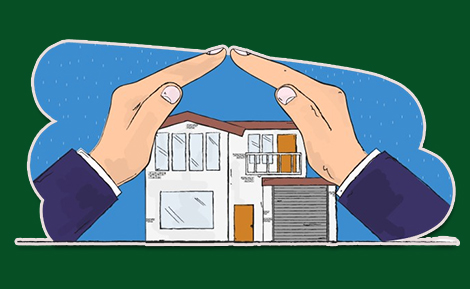Does landlord insurance cover tenant damage? This is an interesting question and one of the most effective ways to find the answer is to understand your coverage.

Undoubtedly, there are many financial risks that landlords face when it comes to renting out their properties. Amidst the potential concerns, tenant-caused damage is worrisome.
Whether it is broken fixtures, significant problems, or accidental spills, the cost of repairs for such events can be quite expensive and hard to cover out of pocket without insurance. This prompts landlords to ask whether their landlord insurance can cover such incidents.
Meanwhile, it is important to know that the level of coverage can differ depending on the circumstances and policy. If you are interested in protecting your investments, let’s continue to find out more.
Does Landlord Insurance Cover Tenant Damage?
Typically, landlord insurance offers rental property damage coverage caused by the tenants, but the level of coverage can differ depending on the terms of the policy. Moreover, this coverage can be protection against mischievous or accidental damage like ruined carpets, broken windows, or damaged walls caused by the tenants.
On the other hand, some landlord insurance policies might come with exclusions for specific forms of damage or have coverage limits. In other words, there are specific incidents that will not be covered by your policy. You must check your landlord insurance policy to understand the coverage and exclusions in terms of damages caused by tenants.
When Does Landlord Insurance Cover Tenant Damage?
Landlord insurance usually offers tenant damage coverage in certain situations. Here are some instances:
- Malicious Damage
If your property as a landlord was intentionally damaged by your tenant like fixture vandalism or punching holes in the walls, your landlord insurance may cover you.
- Accidental Damage by Tenants
Accidental damage caused by tenants is usually covered by landlord insurance. Events like breaking the window or damaging the walls are also covered.
- Legal Expenses
If you have landlord insurance and would like to take legal action against your tenant for breaching the lease terms or damages beyond the security deposit, you might get coverage.
- Loss of Rent
Some landlord insurance policies offer coverage for loss of rental income to landlords or property owners, especially if the tenant-caused damage makes the property unfit for living like extensive water damage or fire.
What Are the Exclusions?
Even though coverage is applied in specific scenarios, it is important to know the exclusions that might be applied:
- Negligence
If failure to maintain the property or negligence by the tenant is the cause of the damage, landlord insurance may not offer coverage. For example, not reporting or notifying about a leaking pipe which resulted in water damage.
- Wear and Tear
Landlord insurance does not usually cover regular wear and tear on the property or the content in it. Gradual aging from routine use over time is also included.
- Illegal Activities
If the tenant carried out illegal activities which resulted in the damage of your property such as having illegal parties or manufacturing of drugs, coverage might be excluded.
- Unauthorized improvements
If the tenant carries out unapproved improvements or alterations to the property without the consent of the landlord, coverage will not be applied.
- Certain Policy Exclusions
Every insurance quote comes with certain limitations or exclusions when it comes to tenant damage coverage. This is why it is crucial for landlords to check their policy terms carefully to understand the coverages and exclusions.
In summary, when you understand when and when not your landlord insurance offers coverage for tenant damage and exclusions associated, you can protect your properties and investments from unforeseen situations.
How to File a Claim Against Tenant Damage
If you are a landlord or a property owner renting it out to tenants and you find damages to your property, here is how to file a claim to your insurance provider against these damages:
- Document the damage thoroughly.
- Take videos or photos showing the level of damage.
- Go through your lease agreement.
- Understand the obligations of the tenants related to property damage and maintenance.
- Tell your insurance company.
- Report the damage.
- Begin the claims process.
- Give all the necessary documents.
- Provide additional documentation.
- Collaborate with the insurance claim adjuster.
- Follow up on the claim.
- Be prepared in case additional documents or information is needed.
- Ask for legal advice.
- Restore or repair your property.
If your claim gets approved and you receive the repair costs, you can proceed to fix the damage and also address the tenant’s liability.
FAQs
Does landlord insurance always cover damage caused by tenants?
The level of coverage offered by landlord insurance to tenant-caused damages usually differs. Although some policies might not cover specific damages or have limits, malicious and accidental damage are usually covered.
What Should I Do If I Discover Damage Caused By My Tenant?
Start by taking videos and photos of the damage from different angles. Check your lease agreement to find out your tenant’s obligations to the damage while you notify your insurance provider to begin the claim process.
Does Landlord Insurance Pay For Eviction-related Legal Fees?
Legal charges, such those associated with evicting a tenant or collecting past-due rent, may be covered by certain landlord insurance policies. Usually, this is an optional addition to the basic insurance.
Can I obtain insurance for more than one rental property?
Yes, a lot of insurance companies provide portfolio policies that let landlords insure several rental homes at once, frequently at a lower cost.
Is it required to have landlord insurance?
Although not mandated by law, landlord insurance is strongly advised. A condition of your loan arrangement may be that you obtain landlord insurance from some mortgage lenders.



